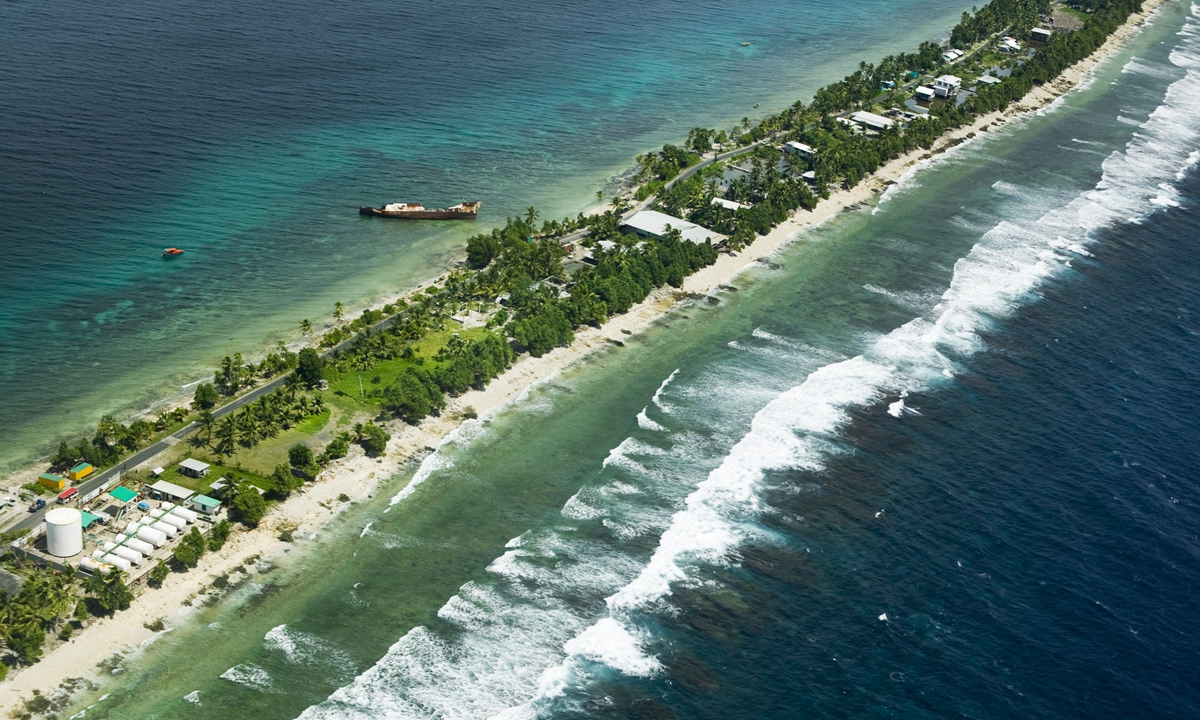
A view of Tuvalu. Photo: VCG
Western countries are keen on using the South Pacific as a stage for geopolitical competition, treating island nations as pawns to counter China's influence. This point couldn't be more evident. Tuvalu is the latest example.
Australia announced on Friday a security guarantee to the Pacific Island nation of Tuvalu, which is threatened by rising sea levels. The guarantee includes offering permanent residency to 280 Tuvalu citizens each year. Some Western media outlets, Reuters in particular, hyped that the resettlement offer means "a win for Australia over China."
The narrative reflects the Western desire to gain an advantage over China in the South Pacific. What they truly care about is not the needs of the South Pacific island countries, but whether they can surpass China's influence in the region.
According to the treaty announced by Australia Prime Minister Anthony Albanese and Tuvalu Prime Minister Kausea Natano, the Friday's deal will give Australia the right to vet the military, police, telecommunications and infrastructure agreements that the Pacific island state of Tuvalu makes with other countries. It's called by observers as a neo-colonial "security" pact. This indicates that the main concern of Australia and other former colonial powers is not climate change, economic development, or social stability in island nations, which are the primary demands of the islanders. Instead, they are focused on sustaining and strengthening their regional hegemony.
Former colonial powers have always desired for island nations to refrain from engaging in South-South cooperation with emerging countries outside the region, and they want these countries to remain politically subservient to the West and economically reliant on the West, following their instructions and manipulation, Yu Lei, professor at Shandong University, told the Global Times.
Tuvalu, with an average elevation of 1.83 meters, is often referred to as the first country that will be totally submerged due to climate change. Tuvalu's Foreign Minister Simon Kofe once gave a speech standing knee-deep in seawater to draw attention to Tuvalu's struggle against rising sea levels.
Under pressure from island nations, Australia agreed to sign an agreement to provide climate migration resources. The symbolic significance of this practice is that Australia is willing to support affected island nations, and Tuvalu's case can be seen as a signal and temptation to other Pacific island countries - as long as they are willing to maintain close ties with Australia, they may receive similar support, said Chen Hong, director of the Australian Studies Centre at East China Normal University.
In recent years, Pacific island nations have shown a growing reluctance to comply with Western directives and manipulation. During the 52nd Pacific Islands Forum, it was emphasized that peace, prosperity and addressing the climate change are "our voice, our choice, our Pacific way." However, the Western governments not only have ignored this, but also blindly urged Pacific island nations to counter China, which has generated deep resentment among these nations.
Island nations welcome China and other emerging countries to engage in economic, trade, and development cooperation with them, as they aspire to achieve true political autonomy and economic independence. For centuries, former colonial powers had dominated the Pacific island region, preventing these nations from attaining political and economic autonomy. Furthermore, they continue to attempt to colonize them in new forms. This is the primary reason why island nations' governments and people welcome China.
China's cooperation with Pacific island nations is mutually beneficial. China has no intention to engage in any form of geopolitical or military competition with former colonial powers. China has consistently emphasized its willingness to carry out joint cooperation with other countries as well as recognizes and respects Australia's longstanding historical and traditional connections with these island nations. Therefore, it is unwise for Australia to align itself with the US and compete with China, or even counter Chinese influence, said Chen Hong. Some Western countries do not want to see Australia take the initiative to improve relations with China, restore mutually beneficial economic cooperation, but instead incite geopolitical competition to provoke conflicts and profit from them, experts warned.



